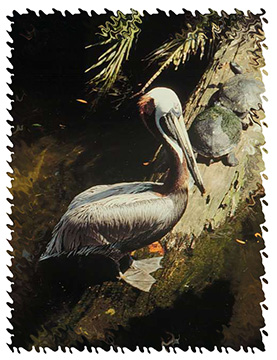![]()


(Pelecanus)
Everyone recognizes these large, heavy-set water birds. They are generally about five feet in length and have a wingspread of from six to nine feet. The pelican's bill is a foot or more long, and beneath this bill hangs the pouch that is the bird's chief claim to fame. The pouch is made of elastic skin and is hardly noticeable when empty. The pelican plunges with open bill into a school of small fish. The pouch serves as a scoop, taking in the fish and often several quarts of water as well. When the bird comes to the surface the water runs out the sides of the bill and the fish are gulped down. They are never stored in the pouch.
Fish are caught by the bird either swimming and scooping or by diving from a height of 30 to 40 feet. At times a group of pelicans work together
in attacking schools of fish at the surface, encircling them or driving them into shallow water. (The American White Pelican does not dive for food but dips its bill into the water while swimming.)
Like all pelicans, the white pelican nests in colonies and lays three or four eggs which are heavily covered with a chalky deposit. The young are naked and ugly when hatched. When partly grown, they gather into little flocks called "pods," which cruise along the shore. When the parents arrive with food, the young pelicans push their bills far down into the older birds' pouches. Parents recognize and feed only their own offspring.
Nesting White Pelicans show a tinge of pink in their plumage. The American White Pelican has feathered cheeks, unlike those of other species. They breed in fresh-water marshes, constructing a bulky nest in reed beds, numbers of birds nesting colonially. Up to four white eggs are laid and incubated for 30 days or so. Both sexes incubate the eggs. Young of all species fledge ten to 12 weeks after hatching.
All but one of the world's six pelicans are mainly white in color, and these include the American, eastern European, African and Asian White Pelican. Large birds (62 in. long with a wingspan of 102 in.) with fully webbed feet (webs connect all four toes).
Pelicans have suffered serious declines in numbers throughout the world due to toxic effects of some pollutants. It is hoped that these distinctive, comical and interesting birds can be preserved.
Pelicans live from 12 to 25 years in the wild.
The plush toy pelicans include Beachy the Douglas Brown Pelican and a little Ganz Pelican Miniature Glass figurine. These plush pelicans can be found at our sponsor's online gift shop.
Image of pelican at top from Nova Development Art Explosion.



